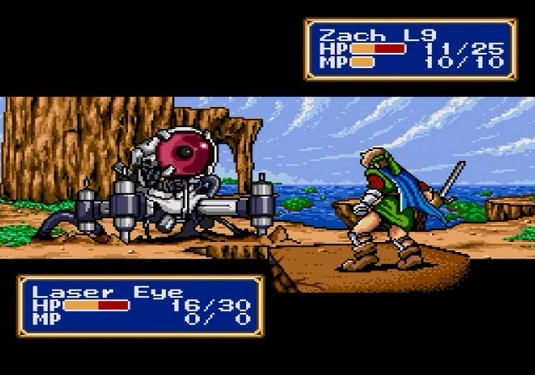
In the 1970s, TSR's Dungeons and Dragons started life as an offshoot and development of tabletop wargaming. It was a logical extension. If complicated rules could be used to govern the movement of units on a board or bespoke miniature battlefield, then why not adapt those rules for a more cooperative, imaginative, and less restrictive gaming experience? By the time computers and consoles came around, the concept was variously adapted for solo adventures. Typically RPGs revolved around a party going through the motions and becoming powerful as experience and money was acquired from killing monsters and the like. How game mechanics, progress, and success in combat were based on numerical attributes and improving on them via an accumulation of experience points lend these games to a cultural critique looking at the inculcation of neoliberal subjectivity. Shining Force certainly sits in this frame, but how it went about its business significantly differed from the standard model. Just as (non-digital) RPGs evolved from wargames, so Shining Force borrowed significantly from console war simulations.
As plots go, it's fairly standard Japanese RPG fare and wasn't a million miles away in inspiration from Sega's Phantasy Star series. It too marries the themes of swords and sorcery to a weird and sometimes jarring science fiction subtext, and it resurrects the bad 'un from its immediate predecessor, the conventional (and, unfortunately, very dull) Shining in the Darkness. Here, the realm of Guardiana is threatened by Dark Sol and the rampaging military of Runefaust and it's up to you and your mates to stop him. As you travel throughout the lands it becomes apparent that your antagonist is looking to collect the bits and bobs necessary to unleash the banished Dark Dragon on the land. That doesn't sound like good news.
Half of the game is typical RPG. Enter into towns to talk to the residents, wander about castles, buying stuff and raising characters who've had their hit points depleted to zero, picking up new characters. So far, so familiar. The icon/menu system used here is very similar to the predecessor game and is entirely user friendly. Which is just as well because the battle system is something of a departure. Taking its cue from the likes of Famicom Wars, combat presents as a battlefield grid around which your party and the enemies take turns to move. At first you don't have too many but you can build your party up to field a maximum of 12 per battle, and each of these are from different classes and races: warriors, mages, monks, knights, archers, and later all manner of beasties. All have different strengths and weaknesses and so do the enemies you face. Warriors are fine bruisers, for instance, but at the lower levels particularly they're slow and nimble-footed enemies can escape their blows - hence you counter them with speedy folks of your own, or magic users. Hence the term tactical RPG. The emphasis is on combat formation, protecting vulnerable party members but giving weaker characters a chance to level themselves up, and deploying the character most appropriate to the combat situation. Thankfully, when it comes to the tactical side of things the computer is pretty rubbish. In almost every situation mortal danger would present if their units swarmed you from the off. Instead they tend to hang back until you enter a particular zone of the battlefield. Also, because the demise of your lead character means game over and a respawn back in the nearest town (minus approximately half your gold) they have a tendency to go after him if he's any way exposed.
The other problem here is despite battles not being random, it is very easy to level up certain characters at the expense of others. You can have almost any of them elevated to super hard standards to the point boss baddies present hardly a challenge. If that happens, the tactical battle system becomes a chore because winning each easily merely means sending forward your beefy minions. The availability of meaty ranged attacks can also make combat a tedious affair, even as the monsters start getting tougher. The true tactical side only really comes out at the lower levels when you have to think and not simply plough through. Welcome, however, is the absence of grinding. Each battle yields enough experience and treasure to theoretically allow for a measured levelling up, but the option is there to go into battles and retreat, rinsing and repeating if you want to toughen everyone. Alas, life's too short these days for that kind of thing.
The accumulation logic remains. Each combat compares attacking and defence scores with an element of random number generation, as per the die throws of paper and pen RPGs. On that basis your character/monster inflicts/receives damage and hit points fall accordingly. As it only takes 100 experience points to move up a level with a (usual) boost to your stats, it pays to feed everyone into the meat grinder. The difference here is you have to be a little bit entrepreneurial and think through your actions whereas standard eight and sixteen-bit RPGs are usually mindless affairs - tactics only really come into play when thinking about deploying magic or healing up.
Shining Force is much better than what came before, and tell has it that Shining Force II is one of the best RPGs ever made. We'll see in due course. Shining Force is certainly an interesting game and is very enjoyable to begin with, though ultimately the accumulation logic of the gameplay - of striving to be powerful and invulnerable - does rob the game of the joys of tactical combat later on. A nice illustration in JRPG form of a dynamic destroying the very thing that made it possible. Where have we encountered such a thing before?
No comments:
Post a Comment